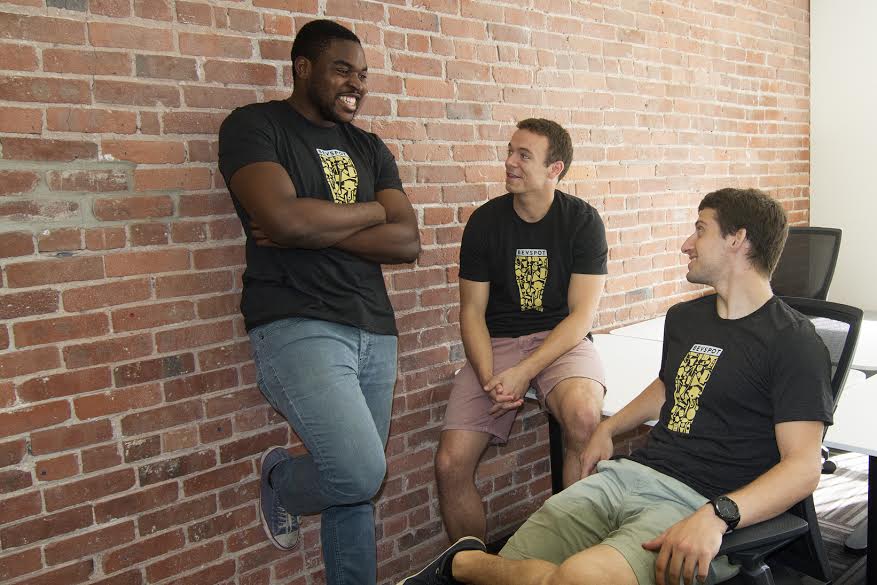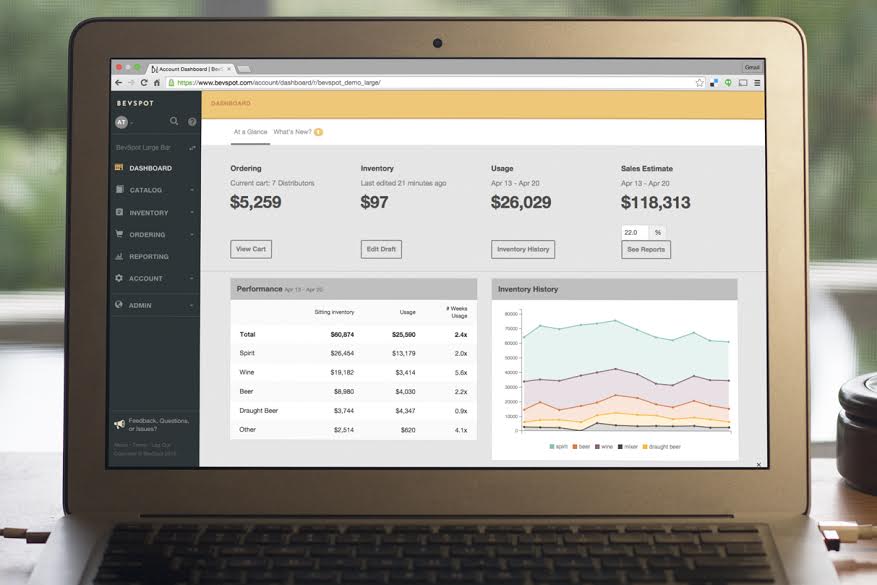BevSpot Is Helping Bars and Restaurants Take Control of Their Inventory

BevSpot cofounders Chidubem Ezeaka, Rory Crawford, and Alex Lesman. / Image Provided
When Rory Crawford started asking bar managers about the most painful part of their job, they described walking into a cold, dark room with a clipboard and pen at 2 a.m. on a Sunday to count their inventory.
“We heard from people in the industry, ‘Things have always been this way,’” Crawford says.
He cofounded BevSpot to prove it doesn’t have to be.
BevSpot provides restaurants and bars with a web-based system that tracks inventory, shows what products are selling, and lets bar managers send orders to their reps. The alternative: spend roughly six hours counting up bottles with pen and paper to then input the information into an Excel spreadsheet week after week.
“Few people think about how those bottles get behind the bar,” Crawford says. “If you have a great business and you don’t need to adapt or evolve, you’re less likely to have technology come in and help you, because you’re not looking for it.”
Crawford learned firsthand how helpful technology could be when he initially tried breaking into the industry. A few years ago, he created an app that would send customers two bottles of wine each month based on their preferences. Users were offered a centralized platform to track what they did and didn’t like so that when a 10-page wine list was placed in front of them, they knew how to order.
But the startup never launched. Playing the liaison between sellers and manufacturers wasn’t sustainable, nor was the company gaining access to any meaningful data.
“There’s a reason why online wine purchasing doesn’t really work,” Crawford says.
Rather than buy and sell products, he decided to create a web-based software that would help others in the industry work more efficiently and communicate more effectively with their distributors.
“One of the core components of our business was to build a world-class technology business, not just an alcohol company,” Crawford explains. “Restaurants and bars are very complicated, hard-to-run businesses. It’s a competitive industry…with no visibility as to who’s coming in tomorrow.”
Crawford created a “crappy” prototype of BevSpot in February 2014 during his first year at Harvard Business School. But with the goal of becoming a “world-class technology business” in mind, he contacted MIT alumni Chidubem Ezeaka and Alex Lesman, former software engineering interns at Amazon and Facebook respectively, and asked them to serve as cofounders. By March, the two were on board and by September, BevSpot was banking $720,000 in seed financing to tackle a notoriously antiquated industry.
“It got me comfortable with dropping out of HBS,” Crawford says. “We built our beta product in five months from scratch, and our accounts liked using it.”
BevSpot has 150 accounts on its roster now—125 of which are local, including No. 9 Park, Lincoln, Catalyst, and Loco. Each pays a monthly fee, starting at $149 per month, for access to the BevSpot software. There is no setup fee, and the subscription can be canceled at any time.

Image Provided
“We stand on the product,” Crawford says. “If it doesn’t change your life for the good, you don’t owe us anything.”
For family businesses, convincing managers of that broader vision can be tricky. “They can be very set in their ways,” Crawford adds. “While pen and paper is a great thing to compete against, at the same time, it’s incredibly easy to use pen and paper. So, how do we deliver mobile technology that’s so seamless it can compete with that?”
One way is by integrating sales into the BevSpot platform so that customers can get a “full-picture account of what they have sold over time and how much profit they have made off of it.” The feature, which the team is working to complete, would help users determine what to re-price or stop selling—something that has attracted distributors’ attention.
As the company continues to grow, BevSpot will work more with distributors, who Crawford says “are excited about the ability to help their customers move their inventory.” By being able to track and communicate orders directly to their sales rep, the rep can focus less on replenishing “inventory that is selling itself” and more on what they prefer to do: sell, and be out tasting new products.
With the help of a $5.25 million Series A in July, the BevSpot team has grown from 10 to 24 employees in two months, and “they are extending offers every day.” The team outgrew the Downtown Crossing office it moved into this past December; they are moving to a space in the Seaport this week.
BevSpot plans to foster that growth by focusing on sales, marketing, and product. The startup is building out additional functionalities for bars and restaurants around data and analytics, as well as creating tools for distributors and suppliers.
“We believe the product is less than one percent where it could be and should be,” Crawford says. “Regardless of how fast we seem to be moving, it never feels fast enough.”
The goal is to be in 20 states in the next nine months, meaning Crawford doesn’t intend on slowing down anytime soon.
“The challenge,” he notes, “is really to try and accelerate it.”


